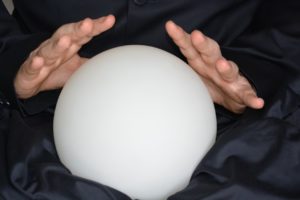You’ve seen the pop-up adds and click bait many times. “He predicted the Great Recession. Now look what stock he says to buy!”
What few ask, however, is this. What other predictions did he make that failed? Were there dozens? Hundreds? No one remembers those. But if you make lots of such guesses, then odds are one or two will be right.
 Freakonomist Steven Levitt tells us just this. “Most predictions we remember are ones which were fabulously, wildly unexpected and then came true. Now, the person who makes that prediction has a strong incentive to remind everyone that they made that crazy prediction which came true. . . . And without any sort of market mechanism or incentive for keeping the prediction makers honest, there’s lots of incentive to go out and to make these wild predictions.”
Freakonomist Steven Levitt tells us just this. “Most predictions we remember are ones which were fabulously, wildly unexpected and then came true. Now, the person who makes that prediction has a strong incentive to remind everyone that they made that crazy prediction which came true. . . . And without any sort of market mechanism or incentive for keeping the prediction makers honest, there’s lots of incentive to go out and to make these wild predictions.”
As Daniel Kahneman points out in Thinking, Fast and Slow, the intuition of experts is pretty good when (1) an environment is regular, and (2) when one has learned “these regularities through prolonged practice” (240). So in specialized fields like nursing and firefighting, expert intuition is likely to be valid.
But where the variables are so wide ranging and the environment so vast that it cannot be regular (like picking the next hot stock or the next political hot spot), then expert intuition has the approximate same value as a warm bucket of spit.
Photo credit: Pixabay, nvodicka
